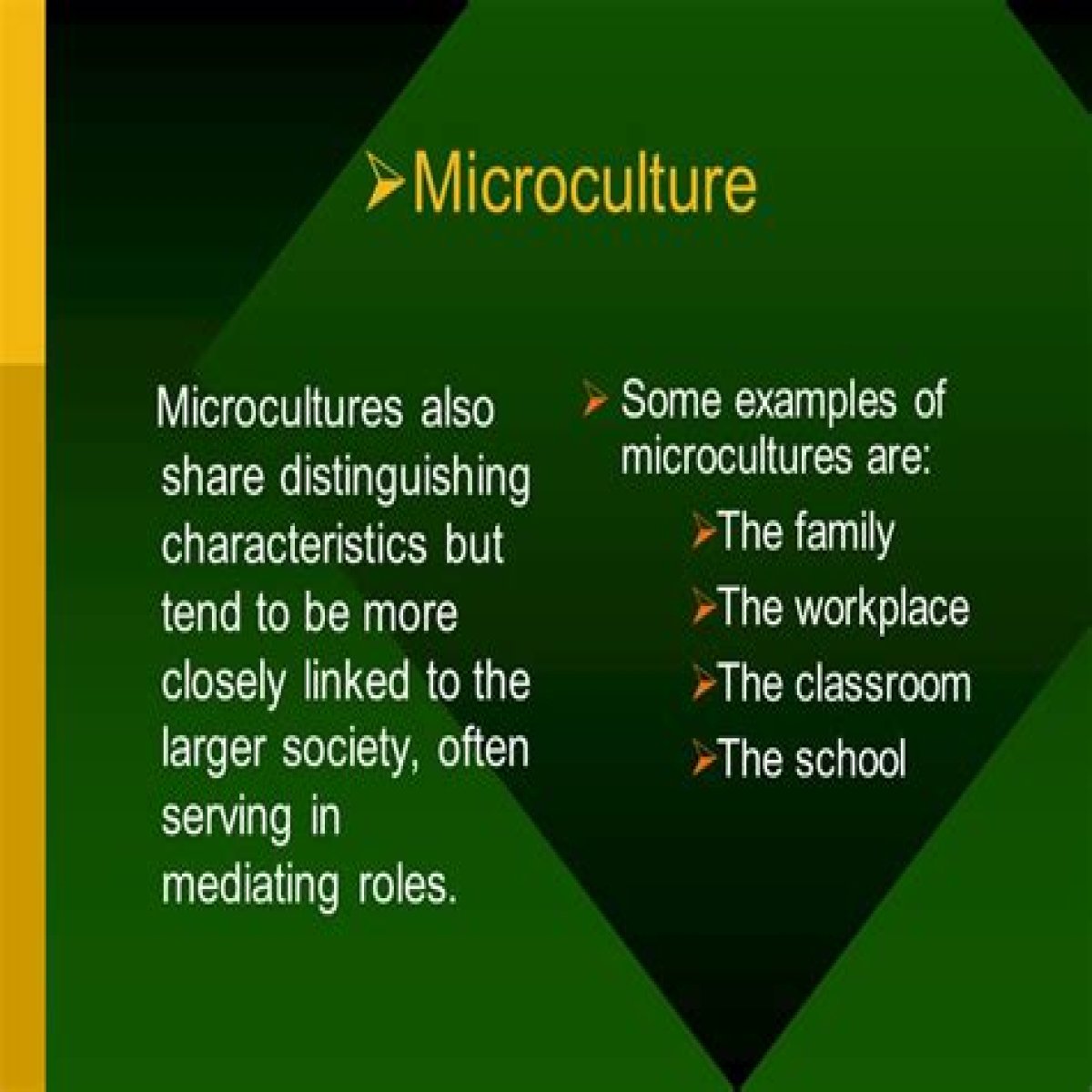What is a Microculture example?
Most microcultural groups are groups of individuals who have much in common with the larger macroculture yet are bonded together by similar experiences, traits, values, or in some cases, histories. For example, Protestants, Catholics, Jews, or Muslims (persons of Islamic faith) might be considered microcultural groups.
What is meant by the term micro culture?
1 : a microscopic culture of cells or organisms. 2 : the culture of a small group of human beings with limited perspective.
What is a macro culture?
A macro-culture is the dominant culture of a particular society and can be defined regionally or nationally. For instance, an area within a state made up of primarily Latin speaking residents would be a micro-culture to the larger macro-culture of the state or nation.
What is a micro culture in sociology?
Definition of Microculture (noun) A distinctive culture shared by a small group that is often based on location or within an organization.
Is family a micro culture?
Each family has their own way of doing things – from the food they eat, the jokes they tell, and the values they hold. As such, every family is its own microculture. In short, we’re the culture makers of our home – establishing the values, rituals, and foundational worldview for our family. …
How does the communication between micro culture?
Answer: The communication between micro-culture adds to the notion that culture is dynamic and heterogeneous makes a huge formation of new language. The micro culture comes from the small and sub cultures of a larger cultural set up. They consider this culture to be independent from the main culture.
How are micro cultures formed?
A microculture – whether formed by a racetrack, a university, a holiday camp or a pub – can be seen as having its own social micro-climate, with values and norms of behaviour of its own, to an extent differing from those of the general culture. Such micro-climates are situational, specific to their own circumstances.
How do Microcultures affect value?
How do microcultures affect value? Microculture is define as a group of people who share similar values and tastes that are subsumed within a larger culture. Many times, microcultures coexist in a larger culture, but these microcultures can change the value of things from the larger cultures.
What is meant by culture is dynamic and heterogeneous?
Culture is dynamic and heterogeneous means that culture changes. A person who grows up in one culture is not tied down to that culture. If that person moves to a completely different area and takes on all the cultural values therein, he/she can be viewed as a part of that new culture.
What do we mean by culture is dynamic?
All cultures are dynamic and constantly changing as individuals navigate and negotiate the beliefs, values, ideas, ideals, norms, and meaning systems that make up the cultural environment in which they live.
What are the elements of culture?
The major elements of culture are symbols, language, norms, values, and artifacts. Language makes effective social interaction possible and influences how people conceive of concepts and objects.
What are 5 aspects of culture?
5 COMPONENTS OF CULTURE TECHNOLOGY, SYMBOLS, LANGUAGE, VALUES, & NORMS.
What are examples of company culture?
One example of company culture can be seen at Netflix, where it is encapsulated in their philosophy of “people over process.” In its company culture document, Netflix spells out its company values: judgment, communication, curiosity, courage, passion, selflessness, innovation, inclusion, integrity, and impact.
What is the purpose of culture?
Culture is the lifeblood of a vibrant society, expressed in the many ways we tell our stories, celebrate, remember the past, entertain ourselves, and imagine the future. Our creative expression helps define who we are, and helps us see the world through the eyes of others.
What are the disadvantages of culture?
Among the most noticeable disadvantages of cultural diversity include language barriers, social tension, and civic disengagement. It should be noted that these are not reasons to avoid diversity, but rather, factors to keep in mind as society heads toward a more diverse future.
How does culture affect our daily life?
Our culture shapes the way we work and play, and it makes a difference in how we view ourselves and others. It affects our values—what we consider right and wrong. This is how the society we live in influences our choices. But our choices can also influence others and ultimately help shape our society.
What are the effects of culture?
We have seen that culture equips people with the social repertoire necessary to understand and interpret other people’s actions and motivations, and gives people the confidence necessary to act socially. We have seen that culture increases confidence in people’s identity and group, and changes values.
What are main characteristics of culture?
Culture has five basic characteristics: It is learned, shared, based on symbols, integrated, and dynamic. All cultures share these basic features. Culture is learned.
